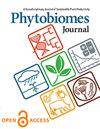Amplicon sequencing of Fusarium translation elongation factor 1α reveals that soil communities of Fusarium species are resilient to disturbances caused by crop and tillage practices
IF 3.3
3区 生物学
Q2 MICROBIOLOGY
引用次数: 1
Abstract
The fungal genus Fusarium contains plant pathogens, mutualists, and commensalists. As non-pathogenic Fusarium strains can contribute to disease-suppression in soil by competition or induced plant resistance, identifying factors that influence the abundance of non-pathogenic strains could lead to strategies that enhance plant-beneficial interactions and deter pathogen invasion. We developed a Fusarium-specific translation elongation factor 1α (EF-1α) high-throughput amplicon-sequencing method with sub-species resolution. Newly designed primers enabled reads to be joined for improved quality metrics after Illumina MiSeq sequencing. By including the ‘oligotyping’ program in our bioinformatic workflow, we reconstructed Fusarium EF-1α haplotypes with 100% accuracy. We conducted simulated crop rotation experiments in soil infested with the strawberry pathogen F. oxysporum f. sp. fragariae (Fof) and the following treatments: strawberry, blackberry, raspberry, lettuce, broccoli, and fallow. We profiled root Fusarium communities with EF-1α amplicons and observed that non-pathogenic strains of F. oxysporum did not colonize crops uniformly; some strains exhibited asymptomatic host preferences. In susceptible strawberry roots, >90% of sequences corresponded to Fof. Bulk soil communities of Fusarium were remarkably stable and had minimal treatment-dependent effects after one year. Similarly, in a long-term agricultural research experiment, 18 years of conservation tillage and cover cropping did not lead to bulk soil Fusarium communities that were significantly different than controls. While the roots of rotation crops can augment the abundance of non-pathogenic F. oxysporum strains, their abundance in bulk soil is unlikely to be altered after a single year. Climate and soil physicochemical properties may have a greater effect on Fusarium community structure.镰刀菌翻译延伸因子1α的扩增子测序表明,镰刀菌物种的土壤群落对作物和耕作方式造成的干扰具有抵抗力
镰刀菌属包含植物病原体、共生菌和共生菌。由于非致病性镰刀菌菌株可以通过竞争或诱导植物抗性来抑制土壤中的疾病,识别影响非致病性菌株丰度的因素可以导致增强植物有益相互作用和阻止病原体入侵的策略。我们开发了一种具有亚物种分辨率的镰刀菌特异性翻译延伸因子1α(EF-1α)高通量扩增子测序方法。新设计的引物使Illumina MiSeq测序后的读数能够连接起来,以提高质量指标。通过将“寡分型”程序纳入我们的生物信息学工作流程,我们以100%的准确率重建了镰刀菌EF-1α单倍型。我们在草莓病原体尖孢镰刀菌(Fof)和以下处理的土壤中进行了模拟轮作试验:草莓、黑莓、覆盆子、生菜、西兰花和休耕。我们用EF-1α扩增子对根镰刀菌群落进行了分析,并观察到尖孢镰刀菌的非致病菌株不能均匀地定植在作物上;一些菌株表现出无症状的宿主偏好。在易感草莓根中,>90%的序列对应于Fof。镰刀菌的大量土壤群落非常稳定,一年后对处理的依赖性影响最小。同样,在一项长期农业研究实验中,18年的保护性耕作和覆盖种植并没有导致大量土壤镰刀菌群落与对照显著不同。虽然轮作作物的根系可以增加非致病性尖孢镰刀菌菌株的丰度,但它们在大块土壤中的丰度在一年后不太可能改变。气候和土壤理化性质可能对镰刀菌群落结构有较大影响。
本文章由计算机程序翻译,如有差异,请以英文原文为准。
求助全文
约1分钟内获得全文
求助全文

 求助内容:
求助内容: 应助结果提醒方式:
应助结果提醒方式:


